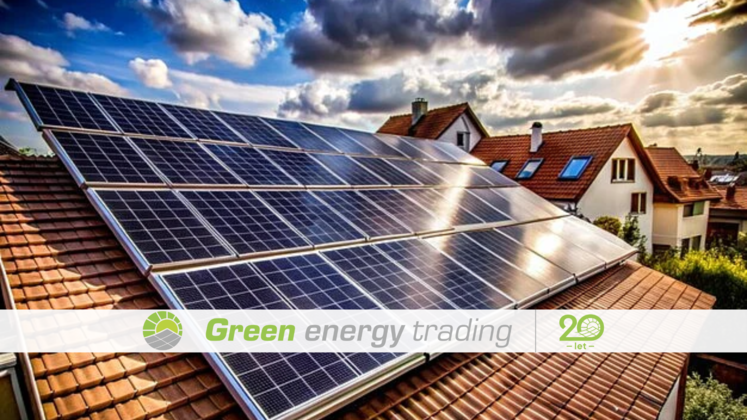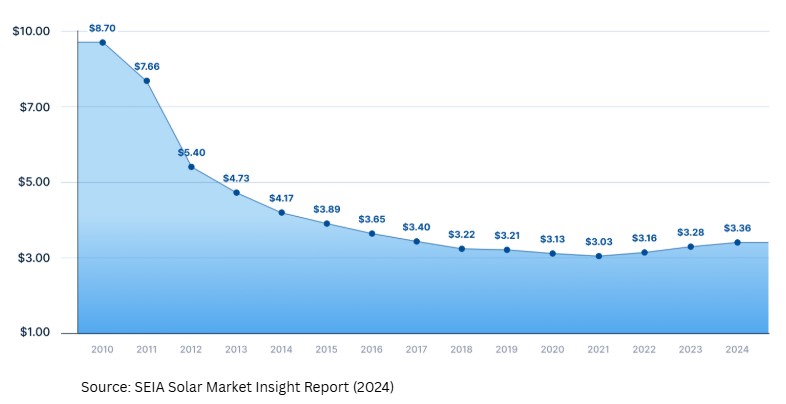Advantages and disadvantages of solar energy in 2025
 4. 9. 2025
4. 9. 2025
As the need for clean energy becomes increasingly apparent, there is a significant increase in the transition to renewable energy production. Solar energy is a renewable resource that can reduce our carbon footprint and meet energy demand, all while reducing electricity costs. However, it is important to know that while solar energy has many advantages, it also has a number of disadvantages.
Here is a comprehensive list of the advantages and disadvantages of solar energy in 2025.
Eight advantages of solar energy
From savings on energy bills to reduced carbon emissions, solar energy systems have many benefits you may not be aware of. Here are 8 advantages of using solar energy:
Solar energy is a sustainable and renewable energy source
Sunlight is one of the most abundant sources of energy on the planet, and using solar panels does not deplete its power. Because using solar energy does not reduce the amount of sunlight available, it is considered a renewable resource.
Unlike fossil fuels, which have limited supplies, renewable resources such as the sun are infinite or can be replenished within a human lifetime, making them a much more sustainable solution for our ever-growing energy needs.
Solar energy is environmentally friendly
When solar panels generate electricity, they do not release any harmful greenhouse gases into the atmosphere, making solar energy a clean source of energy. Because no harmful gases or particles are produced during the generation of solar energy, the impact on health and the environment is minimized.
By increasing the use of solar energy and reducing our dependence on fossil fuels such as natural gas and coal, we are making the planet a healthier place to live while fighting climate change.
Solar energy saves on electricity costs
Probably the biggest advantage of owning solar panels for your home is that they help reduce your electricity bills. By using energy generated on your roof, you reduce the amount of electricity you purchase from your utility company, thereby lowering your energy bills. Solar panels also help insure you against rising electricity costs—as they go up, your savings go up!
By 2025, the average household could save around $1,400 per year on electricity bills thanks to a residential solar panel system. Most homeowners can recoup their investment in solar energy within 10 to 12 years, but actual savings will depend on the specific system and where you live.
Even large solar farms and solar systems for public services can reduce energy costs. Solar energy is cheap to produce and does not require expensive mining or complex power plants, as is the case with traditional fossil fuels.
Solar systems require minimal maintenance
Solar panels require very little maintenance, especially if they are tilted at a certain angle. Rain usually washes away any dirt that could affect the efficiency of your solar photovoltaic system. However, if you live in a drier and dustier climate, occasional cleaning of your solar panels to remove dirt can't hurt.
The main reason solar panels are low maintenance is that they have no moving parts, which minimizes the risk of equipment failure. Any problems can be covered by a solar warranty, which helps keep maintenance costs relatively low.
Solar panels are eligible for incentives
Solar energy incentive and discount programs are available in almost all states. You can get subsidies not only for panels, but also for battery systems and other components. Specific subsidy programs vary by state.
Solar technology is more advanced and affordable than ever before
Thanks to a number of advances in solar cell technology, solar panels are much better at producing electricity than they were 15 years ago. In 2010, the average efficiency of solar panels was about 15%. Today, solar panels are generally between 20% and 23% efficient!

Not to mention that the cost of solar panels has decreased. In 2010, a solar installation cost the average homeowner about $8.66 per watt. Currently, the average solar installation costs only $3.03 per watt on average.
Solar panels can increase property value
Solar panels are considered an energy upgrade for your home and can potentially increase its value. With solar panels, you may even be able to sell your home faster than without them.
Experts at SolarReviews analyzed more than 400 homes on Zillow and found that homes with solar panels sell for an average of 6.9% more than homes without solar panels. The value that solar panels add to your home depends on several factors, such as your location, the size of the system, the condition of the solar system, and how it is financed.
Solar energy increases energy independence
Solar panels allow homeowners to generate their own energy instead of relying on the electric grid, helping them achieve energy independence from their utility company and greater control over where their home's energy comes from.
Five disadvantages of solar energy
Although solar energy offers many advantages, it is also important to consider some potential disadvantages before installing a system on your roof.
Solar energy has high upfront costs
Although the price of solar panels has dropped significantly over the past decade, solar energy for homes still represents a high upfront cost. There are incentive programs and financing options available to help with the initial costs, but it can still be a significant investment.
Solar energy is an intermittent energy source
Solar energy is considered an intermittent energy source because the amount of energy that solar panels produce is generally dependent on the weather. The intensity of sunlight varies depending on location, time of day, and season, which means that solar energy production can fluctuate and be unpredictable.
There is no real guarantee that solar panels will always produce exactly the amount of energy you need. However, you can combine solar panels with battery storage to make solar energy more reliable. Energy storage systems store solar energy during the day so that it can be used when the sun is not shining.
Roof characteristics and location restrictions
Unfortunately, not every roof is suitable for solar panels. For your solar installation to be a worthwhile investment, your roof must have certain characteristics that are suitable for solar panels.
Reasons why your home may not be suitable for solar panels include: Your roof is completely shaded, your roof is old and needs to be replaced. Your roof does not have enough space, your roof cannot support the added weight of solar panels
Solar energy has a certain impact on the environment
While it is true that solar panels produce clean, renewable energy, their production has an impact on the environment. Solar panel manufacturing plants emit greenhouse gases into the atmosphere, and the extraction of raw materials used in solar panels can have an impact on the surrounding environment.
In addition, large solar installations require a significant amount of land, which can potentially affect the migration routes of some animals or increase soil erosion during installation.
Despite this, solar panels are still a much better choice for the environment and human health than the use of fossil fuels.
The value of solar energy depends on local policy
Some areas are more favorable for solar energy than others, meaning that state, energy, or local policies make solar energy a smart investment for residents. If you live in a state that does not prioritize solar energy, solar energy may not be as good a financial investment.
Do the advantages of solar energy outweigh the disadvantages?
In most cases, solar panels are a good investment for homeowners because of their benefits.
Long-term savings on electricity bills and increased property value offset the high initial costs. Plus, the accumulated savings will help you pay off your solar system investment in 10 to 12 years! Solar panels typically have a lifespan of over 25 years, so you can count on more than a decade of free electricity!
Whether solar panels are right for your specific home depends on where you live, your budget, the characteristics of your roof, available subsidies, and how much energy you consume.
